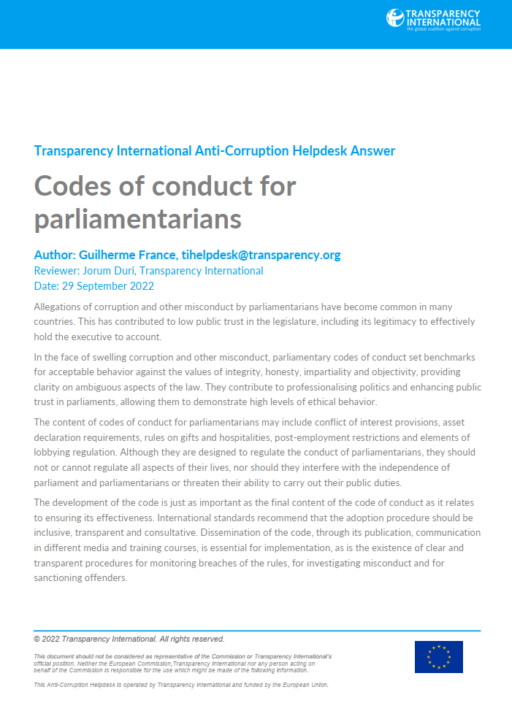
This Anti-Corruption Helpdesk brief was produced in response to a query from one of Transparency International’s national chapters. The Anti-Corruption Helpdesk is operated by Transparency International and funded by the European Union.
Query
Provide an overview of codes of conduct for parliamentarians, including best practices for the development and implementation of such codes. Please include examples from Commonwealth countries.
Summary
Allegations of corruption and other misconduct by parliamentarians have become common in many countries. This has contributed to low public trust in the legislature, including its legitimacy to effectively hold the executive to account.
In the face of swelling corruption and other misconduct, parliamentary codes of conduct set benchmarks for acceptable behavior against the values of integrity, honesty, impartiality and objectivity, providing clarity on ambiguous aspects of the law. They contribute to professionalising politics and enhancing public trust in parliaments, allowing them to demonstrate high levels of ethical behavior.
The content of codes of conduct for parliamentarians may include conflict of interest provisions, asset declaration requirements, rules on gifts and hospitalities, post-employment restrictions and elements of lobbying regulation. Although they are designed to regulate the conduct of parliamentarians, they should not or cannot regulate all aspects of their lives, nor should they interfere with the independence of parliament and parliamentarians or threaten their ability to carry out their public duties.
The development of the code is just as important as the final content of the code of conduct as it relates to ensuring its effectiveness. International standards recommend that the adoption procedure should be inclusive, transparent and consultative. Dissemination of the code, through its publication, communication in different media and training courses, is essential for implementation, as is the existence of clear and transparent procedures for monitoring breaches of the rules, for investigating misconduct and for sanctioning offenders.
Contents
- Introduction
- Codes of conduct for parliamentarians
- Relevant factors for ensuring effectiveness
- Content
- Examples from Commonwealth countries
- References
Main points
- Parliaments often rank among the most corrupt institutions in countries.
- Codes of conduct for parliamentarians have been central in efforts to improve their standing before voters. They establish clear, effective and fair rules of conduct.
- Adoption procedures should be inclusive, transparent, and consultative. Dissemination of the code is essential, as is the existence of clear and transparent procedures for monitoring breaches of the rules, for investigating misconduct and for sanctioning offenders.
- Codes of conduct for parliamentarians may include, in its content, conflict of interest policies, asset declaration requirements, rules on gifts and hospitalities, post-employment restrictions and elements of lobbying regulation.
Caveat
This Answer builds on previous Helpdesk Answers on the topic: Parliamentary Ethics Committees, The Effectiveness of Codes of Conduct for Parliamentarians, Implementing Codes of Conduct in Public Institutions, as well as the Topic Guide on Codes of Conduct.
Authors
Guilherme France, [email protected]
Reviewer
Jorum Duri, Transparency International
Date
26/10/2022

